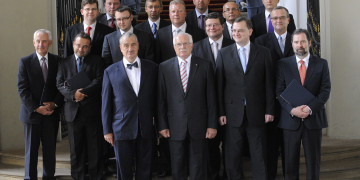With the new right-wing government in Poland, the V4 may be perceived as a new ‘nay’ club in the EU. However, research shows that that the Visegrad Group, composed of the Czech Republic, Slovakia, Poland and Hungary, should prioritise its relations with Germany, writes Vít Dostál.
We will soon celebrate the 25 anniversary of the Visegrad Group. In February 1991, the newly-elected democratic leaders of Czechoslovakia, Hungary and Poland, met in the city of Visegrad to sign a declaration, with the ultimate goal of joining the Euro-Atlantic structures. This mission was accomplished by 2004. Since then, we keep asking what the role of the Visegrad Group in the EU is.
With the refugee crisis, the grouping has been labeled as anti-refugee community unwilling to share solidarity, with those countries hit by massive inflow of migrants, as Hungary, the Czech Republic and Slovakia voted against refugee quotas in September.
With the new right-wing government in Poland, V4 may be perceived as a new ‘nay’ club in the EU. However, it has much more to offer. After extensive research, the Prague-based Association for International Affairs revealed what the foreign policy elites in the Visegrad Group actually think. A survey polled a group of over 1700 foreign policy professionals, and 429 responded.
The role of the V4
The V4 is said to be in constant crises, since the views of four participating countries tended to vary a lot. It was the Russian-Ukrainian conflict that spoiled the image of the V4 as a cohesive group, which is able to readily act against an external threat. Budapest is perceived to be in sharp conflict with Warsaw’s foreign policy. However, all four countries agree that energy security, instability in the EU’s neighborhood, and migration will be the top issues for their foreign policies by 2020.
Moreover, the foreign policy professionals believe that energy policy, immigration and the single market, what will be the EU’s focus over the next five years, according to respondents of the survey.
Energy, migration and eastern policy are the areas where the V4 should join its forces, say the interviewees. V4 cooperation in migration policies was not developed until it reached the EU level this year, and is framed in the West as anti-refugee. Therefore, one can hardly recommend it to as a flagship policy of the V4. On the other hand, energy and eastern policies are areas where V4 has been able to put forward several initiatives at EU level.
EU coordination
Around 60% of the respondents mentioned that the V4 is successful in coordinating itself in Brussels. Moreover, all four foreign policy communities selected Germany as the top foreign policy partner and evaluated its relations with Berlin as very good. Thus, one may conclude, that if any of the V4 countries escalates the divisions with Germany – i.e. on refugees – it will not get a positive and supportive response in other V4 capitals. That is something that the new leaders in Warsaw should think about.


